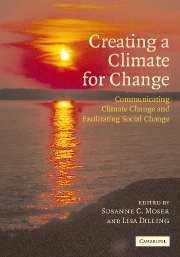Book contents
- Frontmatter
- Contents
- Preface
- Foreword
- List of contributors
- List of tables
- List of figures
- List of text boxes
- Introduction
- Part I Communicating climate change
- Part II Facilitating social change
- 15 Stuck in the slow lane of behavior change? A not-so-superhuman perspective on getting out of our cars
- 16 Consumption behavior and narratives about the good life
- 17 Educating for “intelligent environmental action” in an age of global warming
- 18 Education for global responsibility
- 19 Changing the world one household at a time: Portland's 30-day program to lose 5,000 pounds
- 20 Changing organizational ethics and practices toward climate and environment
- 21 Change in the marketplace: business leadership and communication
- 22 The market as messenger: sending the right signals
- 23 Making it easy: establishing energy efficiency and renewable energy as routine best practice
- 24 Forming networks, enabling leaders, financing action: the Cities for Climate Protection™ campaign
- 25 Ending the piecemeal approach: Santa Monica's comprehensive plan for sustainability
- 26 States leading the way on climate change action: the view from the Northeast
- 27 West Coast Governors' Global Warming Initiative: using regional partnerships to coordinate climate action
- 28 Building social movements
- 29 Climate litigation: shaping public policy and stimulating debate
- 30 The moral and political challenges of climate change
- Part III Creating a climate for change
- About the authors
- Index
- References
29 - Climate litigation: shaping public policy and stimulating debate
Published online by Cambridge University Press: 20 August 2009
- Frontmatter
- Contents
- Preface
- Foreword
- List of contributors
- List of tables
- List of figures
- List of text boxes
- Introduction
- Part I Communicating climate change
- Part II Facilitating social change
- 15 Stuck in the slow lane of behavior change? A not-so-superhuman perspective on getting out of our cars
- 16 Consumption behavior and narratives about the good life
- 17 Educating for “intelligent environmental action” in an age of global warming
- 18 Education for global responsibility
- 19 Changing the world one household at a time: Portland's 30-day program to lose 5,000 pounds
- 20 Changing organizational ethics and practices toward climate and environment
- 21 Change in the marketplace: business leadership and communication
- 22 The market as messenger: sending the right signals
- 23 Making it easy: establishing energy efficiency and renewable energy as routine best practice
- 24 Forming networks, enabling leaders, financing action: the Cities for Climate Protection™ campaign
- 25 Ending the piecemeal approach: Santa Monica's comprehensive plan for sustainability
- 26 States leading the way on climate change action: the view from the Northeast
- 27 West Coast Governors' Global Warming Initiative: using regional partnerships to coordinate climate action
- 28 Building social movements
- 29 Climate litigation: shaping public policy and stimulating debate
- 30 The moral and political challenges of climate change
- Part III Creating a climate for change
- About the authors
- Index
- References
Summary
Introduction
Advocates interested in climate policy are turning to the courts to try to force action on issues relating to human-induced climate change. Climate litigation involves elements of law, science, policy, and ethics in addressing claims relating to global warming. Applying a variety of legal theories, litigants are using climate litigation to clarify existing law, challenge corporate behavior, assign responsibility, and seek damages for climate-related injuries. These cases rely heavily on expert scientific testimony and are likely to affect perceptions about the credibility, salience, and legitimaczy of climate science. They also are likely to encourage public debate and to stimulate political advocacy.
Many of these lawsuits have been filed in the United States, where litigation is widely used to resolve environmental disputes, but these cases have both national and international implications. Climate litigation can help shape US policy relating to climate change, both directly and indirectly; explain specific issues relating to climate change; provide guidelines for establishing causation and assigning responsibility for climate-related injuries; and affect perceptions about climate science that may influence policies and legal decisions beyond the borders of the United States.
Many of these cases are likely to be unsuccessful from the point of view of those hoping for greater action on climate change. Even an unsuccessful case, however, can make climate change more visible to a range of audiences by raising awareness, educating the public, and stimulating public debate on issues relating to climate change.
- Type
- Chapter
- Information
- Creating a Climate for ChangeCommunicating Climate Change and Facilitating Social Change, pp. 462 - 474Publisher: Cambridge University PressPrint publication year: 2007
References
- 1
- Cited by



